 If you’re deciding to become a whistleblower, there are a number of issues that you should consider. The first of these is to know that just because you provide information to the Securities and Exchange Commission (SEC) about a potential securities violation, that does not mean that you are automatically eligible to receive a whistleblower award. So let’s look at what it takes for you to be considered “an eligible whistleblower” (i.e., someone eligible for an award). Continue reading
If you’re deciding to become a whistleblower, there are a number of issues that you should consider. The first of these is to know that just because you provide information to the Securities and Exchange Commission (SEC) about a potential securities violation, that does not mean that you are automatically eligible to receive a whistleblower award. So let’s look at what it takes for you to be considered “an eligible whistleblower” (i.e., someone eligible for an award). Continue reading
Articles Posted in SEC Whistleblower
$36 M Awarded To SEC Whistleblower For Providing Information On An Illegal Scheme
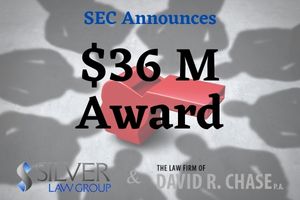 On September 24, 2021, the Securities and Exchange Commission (SEC) announced that it awarded roughly $36 million to a whistleblower who provided information and assistance that “significantly contributed to the success of an SEC enforcement action as well as actions by another federal agency.”
On September 24, 2021, the Securities and Exchange Commission (SEC) announced that it awarded roughly $36 million to a whistleblower who provided information and assistance that “significantly contributed to the success of an SEC enforcement action as well as actions by another federal agency.”
The other agency was not named, and limited information was provided in order to protect the identity of the whistleblower. Continue reading
SEC Awards $11.5M To Two Whistleblowers
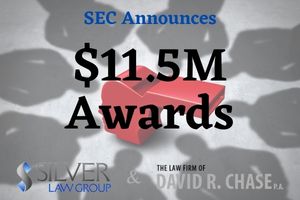 The SEC continues awarding monies to whistleblowers who assist staff with information that either leads to a successful enforcement action or makes things easier for investigative staff.
The SEC continues awarding monies to whistleblowers who assist staff with information that either leads to a successful enforcement action or makes things easier for investigative staff.
Two whistleblowers have been awarded a combined bounty of $11.5 million. The first whistleblower received an award of nearly $7 million, and the second received $4.5 million for information and assistance in the case. Continue reading
SEC Surpasses $1B In Whistleblower Bounties With $110M Award
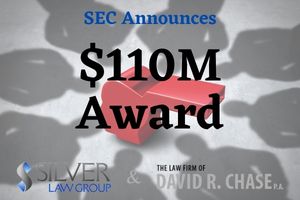 In one of the highest payouts since the inception of the SEC’s Whistleblower Program, an individual recently received a total bounty of an astounding $110M. It’s the second highest award paid to a whistleblower, following a $114M award paid just last October. The SEC awarded the individual $40 million, and the other agency paid $70 million for a related action. Continue reading
In one of the highest payouts since the inception of the SEC’s Whistleblower Program, an individual recently received a total bounty of an astounding $110M. It’s the second highest award paid to a whistleblower, following a $114M award paid just last October. The SEC awarded the individual $40 million, and the other agency paid $70 million for a related action. Continue reading
Five Whistleblowers Receive SEC Bounty Totaling $2.6M
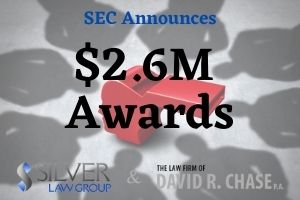 The SEC continues to award whistleblowers who provide pertinent information leading to successful enforcement actions.
The SEC continues to award whistleblowers who provide pertinent information leading to successful enforcement actions.
$2.6 million was recently awarded for three different orders involving five individuals who assisted the SEC. Continue reading
SEC Awards $6M To Two Whistleblowers
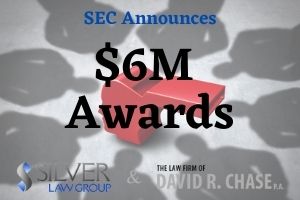 Whistleblowers have made a busy summer for the SEC this year, and there is no sign of any slowdown. Two cases saw bounties of $6 million, as described in a recent press release.
Whistleblowers have made a busy summer for the SEC this year, and there is no sign of any slowdown. Two cases saw bounties of $6 million, as described in a recent press release.
In the first order, whistleblower received a bounty of over $3.5 million after reporting new and beneficial information to the SEC. This information helped SEC to expand an already-existing investigation into a new geographical area. Noted in the SEC order is that this whistleblower is also a foreign national, and traveled for in-person meetings with staff multiple times regarding this case. The individual continued to provide assistance and information that ultimately led to charges related to the enforcement action, and ultimately, an award. Continue reading
Three Individuals Receive $3.5M In SEC Awards
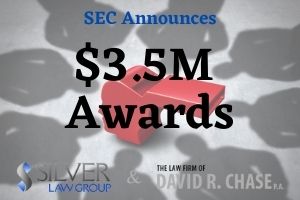 The SEC has announced the award of $3.5 million to whistleblowers in two unrelated successful enforcement proceedings.
The SEC has announced the award of $3.5 million to whistleblowers in two unrelated successful enforcement proceedings.
In the first case, one individual was awarded a bounty of $2M after alerting the SEC to an ongoing fraud that led to the agency opening their investigation. The individual offered continuing assistance, which included documents, interviews, and other information that helped SEC staff conserve time and resources. Continue reading
SEC Awards $4 Million In Bounties To Whistleblowers
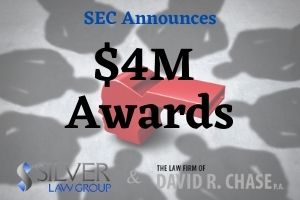 Four whistleblowers who assisted the SEC in two separate enforcement proceedings have been individually awarded a financial bounty as a result of providing important information.
Four whistleblowers who assisted the SEC in two separate enforcement proceedings have been individually awarded a financial bounty as a result of providing important information.
- The first order saw awards to two whistleblowers, with the first receiving a $2 million award. The provided information led to an investigation, and the individual provided continual assistance including in-person interviews and the identification of central entities and persons. The second whistleblower in the order was awarded $150,000 after providing more limited information expanding the investigation into additional allegations of misconduct at the same company.
- The second order awarded $1.1 million to the first whistleblower, and the second in excess of $500,000. The first whistleblower alerted the SEC to the misconduct after reporting it internally. The second whistleblower’s information was not as extensive, and not submitted as timely as the first one, with some “unreasonable delay.” The two actions arose from the same “nucleus of facts.” Therefore, this action was treated as a single covered action when determining the amount of awards given to both individuals. A third whistleblower was involved in this action. However, the SEC decided against awarding a bounty, and the individual chose not to seek reconsideration of that decision.
Whistleblower Reporting For Insider Trading
 Although insider trading is clearly illegal, it is hard to detect without the participation of whistleblowers who collaborate with the Securities and Exchange Commission (SEC) and the Commodity Futures Trading (CFTC).
Although insider trading is clearly illegal, it is hard to detect without the participation of whistleblowers who collaborate with the Securities and Exchange Commission (SEC) and the Commodity Futures Trading (CFTC).
Illegal insider trading occurs when individuals buy or sell securities based on non-public information. Dishonest insiders intend to anticipate market moves and make illegal advantageous trades while outsiders miss out on profits or suffer losses. Continue reading
SEC Awards $2.9M To Whistleblower
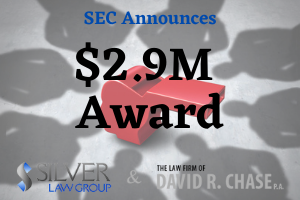 The SEC’s Office of the Whistleblower has awarded another bounty to someone who helped by offering information.
The SEC’s Office of the Whistleblower has awarded another bounty to someone who helped by offering information.
The individual involved provided original information that led to a successful enforcement action. The information provided by the individual assisted the SEC with both administrative and judicial actions, and were treated as a single “Covered Action.” Continue reading
 SEC Whistleblower Lawyer Blog
SEC Whistleblower Lawyer Blog

